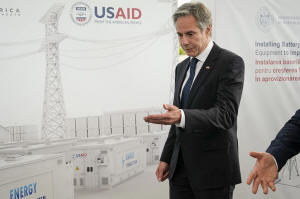US aid was long a lifeline for Eastern Europe. Trump cuts are sending
shockwaves through the region
 Send a link to a friend
Send a link to a friend
 [January 31, 2025] By
STEPHEN McGRATH and AUREL OBREJA [January 31, 2025] By
STEPHEN McGRATH and AUREL OBREJA
CHISINAU, Moldova (AP) — President Donald Trump’s abrupt freeze of U.S.
foreign aid is sending shockwaves through Eastern Europe, leaving
pro-democracy groups, independent media, civil society initiatives and
local governments scrambling to make ends meet in a region often defined
by rivalries between East and West.
The U.S. State Department said that the 90-day freeze aims to root out
waste and block so-called woke programs to expose U.S.-funded activities
“that run contrary to our national interests” — as Trump aggressively
rolls out his “America First” agenda.
Fears of a rise in influence from Russia and China
Eastern Europe has been a longtime geopolitical battleground where
Western foreign policy interests often collide with those of Moscow or
Beijing.
Many fear the cessation of U.S. funds could expose Washington's allies —
and create a vacuum that its foes could gladly seek to fill.
“In Moldova’s case, foreign donor support is vital to balancing the
media landscape," says Oxana Greadcenco, the director of independent
media platform Moldova.org. “Many television networks and media
institutions are funded by Russia so there needs to be a counterbalance
... This is an unprecedented situation, but we are trying not to panic.”

The U.S. Agency for International Development, or USAID, informed her
that grants officially ended on Jan. 24 and they aren’t allowed to spend
any remaining funds in their accounts. This week, Greadcenco promoted
their online Patreon campaign, which garnered 135 new backers in two
days, which should cover salaries for the platform’s 16-strong staff
through March, she said.
“We did not expect it to impact Moldova so severely, as we thought there
would only be a partial cut in funds,” she told The Associated Press.
"Being aware of how much Moldova depends on U.S. funds, not just NGOs
and the press but also local municipalities, many public institutions …
this is a shock for everyone."
Vital aid for former communist countries
Since the 1990s, USAID has invested several billion dollars in countries
like Moldova, Serbia, Albania, Kosovo, and Bosnia and Herzegovina — all
former communist countries with aspirations of joining the European
Union.
In these countries, USAID money has promoted democratic institutions and
reforms, aided infrastructure and energy security projects, bolstered
businesses and economies, and supported a significant number of
nongovernmental organizations and independent media platforms. The
agency says it “tailors its approach to each country’s unique challenges
and opportunities.”
“It’s no exaggeration to say that we have democracy in Moldova, in part
thanks to American financial support,” Valeriu Pasa, the chairman of the
Chisinau-based think-tank WatchDog, said in a statement on Wednesday. He
added that the U.S. benefits "from us being more democratic and
developed, ensuring we don’t turn into a Russian or Chinese colony.”
The wide-ranging effects of the USAID spending freeze spanning different
sectors highlight how critical the funds are to the region.
Sytrime Dervisholi, executive director of the Prefabricated Construction
Association of Kosovo, says the halted USAID funds will adversely affect
her association’s ability to provide technical assistance to member
companies that require vocational education and training, and access to
grants.
“Kosovo, but also our association … is dependent on foreign aid, mostly
on U.S. aid,” she said. “So we really do hope that this measure will be
… canceled after 90 days,” when the funding reviews by U.S. officials
have concluded.

Safet Gerxhaliu, an independent economic analyst in Kosovo, also
believes the USAID freeze could have “a very negative impact” on the
country’s future, affecting everything from the government to the
private sector and education.
“I do believe that the impact is very bad, because those measures come
at the same time that Kosovo is under sanctions from the European
community,” he said. Brussels froze some funding to Kosovo in 2023
following a series of clashes with ethnic Serb minorities.
[to top of second column] |

United States Secretary of State Antony Blinken walks during a visit
to the site of Moldelectrica Chisinau Substation in Braila, a USAID
supported project, south of the capital of Moldova, Wednesday, May
29, 2024. (AP Photo/Vadim Ghirda, File)
 Although Serbia obtained EU
candidate status in 2012, the Balkan nation is also a key ally of
Russia and China in Europe. Under the government of populist
President Aleksandar Vucic, reforms in areas such as strengthening
the rule of law and tackling corruption have been slow, and the
USAID suspension could further hamper progress.
“We currently have a USAID project about public financing. Training
for local NGOs regarding following of public finances,” Nemanja
Nenadic from Transparency International organization in Serbia, told
the AP. “This has been put on hold.”
US funds help monitor elections
For the Promo-LEX Association, a longtime pro-democracy and human
rights NGO in Moldova, USAID funds are vital since they account for
about 75-80% of its projects, which include monitoring elections,
political financing and parliamentary oversight.
“All USAID-funded activities have been put on hold. Without
immediate alternative support, these crucial activities may not
continue at the same scale or effectiveness,” said Ion Manole, the
association’s executive director. “Given previous Russian
interference — through illicit campaign funding, political
corruption, and disinformation — our observation mission is
essential to ensuring electoral transparency."
Moldova will hold a pivotal parliamentary election this fall which
comes after the pro-Western government accused Russia of meddling in
two key votes last year — including backing a vast vote-buying
scheme in the country of about 2.5 million people.
“Without resources, we cannot deploy long-term observers, conduct
election-day monitoring, or track foreign interference effectively,"
Manole said. “A change to an anti-Western government could affect
Moldova’s European path and ... significantly destabilize the whole
of Eastern Europe and the Black Sea region.”
“We remain hopeful that the U.S. government’s evaluation process
will allow programs like ours to resume,” he said, adding that his
NGO is already seeking alternative funding, mainly from European
donors.

A geopolitical opportunity for Moscow
Cristian Cantir, a Moldovan associate professor of international
relations at Oakland University, told the AP that any suspension of
aid “gives Russia an unnecessary opportunity to exploit and benefit
further from Moldova’s weaknesses, which the lack of USAID funding
would exacerbate.”
“Moscow would therefore have greater abilities to derail Chisinau
from its European Union integration course,” he said. “Similarly,
cutting funding to independent news outlets makes it more difficult
for journalists to hold corrupt politicians — many of whom have
connections to Russia — accountable and therefore weakens Moldova’s
sovereignty and institutional independence.”
The Trump administration has cast the aid freeze as an
accountability quest to justify American spending abroad. Beyond
support for Ukraine in recent years, the U.S. is spending about $40
billion in foreign aid annually, according to the U.S. State
Department.
Greadcenco of the Moldova.org news platform hopes that other
international partners will consider stepping in to stem a potential
longer-term shortfall.
“These funds are vital to keeping Moldova afloat,” she said. “I
dread to think what the complete cessation of these funds would mean
for our country.”
___
Stephen McGrath reported from Sighisoara, Romania. Jovana Gec in
Belgrade, Serbia, Llazar Semini in Tirana, Albania, and Florent
Bajrami in Pristina, Kosovo, contributed to this report.
All contents © copyright 2025 Associated Press. All rights reserved
 |